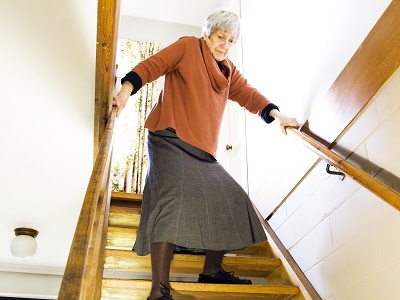Having a fall in older age can have severe physical consequences, such as a broken bone which can take a long time to heal, leaving you ‘laid-up’ and prone to other medical complications.
Then there are the potential psychological consequences, such as a loss of confidence or independence. At the moment, with many older people isolating at home due to the coronavirus pandemic, it’s more important than ever to be aware of the risk of falls, and how to avoid them.
 Falls aren’t an inevitable part of getting older and there’s a lot we can do to minimise our risk of falling, or reduce the impact on our lives if we do. Much of the information which follows comes from the Independent Age charity website, which is a great source of information and advice on many aspects of life in later years.
Falls aren’t an inevitable part of getting older and there’s a lot we can do to minimise our risk of falling, or reduce the impact on our lives if we do. Much of the information which follows comes from the Independent Age charity website, which is a great source of information and advice on many aspects of life in later years.
First let’s look at some physical reasons which might make us prone to falls as we get older. Perhaps the most obvious is stiff, painful joints or weakened muscles due to conditions such as osteoarthritis, which are usually (but not always) age-related. Heart conditions, changes in blood pressure or specific conditions such as Parkinson’s Disease can all make us unsteady on our feet, while hearing problems affect balance and fading sight makes it harder to spot potential hazards.
Some medications can have side-effects which include dizzy spells or feeling light-headed, while if you enjoy the occasional drink, you should know that alcohol is likely to affect you more as you get older. Finally, general tiredness or the confusion associated with dementia can make us more prone to falls, which are usually more likely to result from a combination of these factors than a single one.
Some of these physical risk factors can be significantly reduced by taking positive action. For example, if you find that a particular medication makes you dizzy, tired, or unsteady on your feet, speak to your GP or pharmacist. There could be an alternative medicine which brings the same benefits without the unwanted side-effects.
It’s also important to regularly get your eyesight and hearing checked as you get older. Eyesight is an obvious one – we need to be able to see clearly where we’re going to avoid trip hazards or risky conditions such as ice – but many people don’t realise how much our hearing affects our balance. If you’re over 60 you qualify for a free NHS sight test at least every two years, and your GP can arrange a hearing test or you could take an online hearing test such as this one from Boots Hearingcare.
Here’s something you might not immediately think about… many people fall when rushing to the toilet. Needing to go to the toilet more urgently and frequently can become an issue as we get older, but getting up suddenly can make you dizzy and hurrying can make you generally more likely to fall. Again, consult your doctor if you’re starting to have continence issues – there’s a lot that can be done – but also try to plan ahead so you’re not ‘caught short’.
It’s also important to keep your feet in good condition. As we become older, especially with mobility problems, it can become more difficult to take good care of our own feet, yet it’s even more important to do so. Having a regular visit with a chiropodist is a good idea and you might qualify for free NHS foot care services – ask your GP surgery about this.
There’s also a whole raft of improvements you can make to your home environment to reduce the risk of falls – things like not having loose carpets or trailing wires, keeping key areas clutter-free and making sure risk areas are well-lit. There’s enough to this for a whole other blog, but for now you can download a helpful falls prevention checklist from the Independent Age website by clicking here. Working through the checklist will help make your home safer.
Of all the places in your home where you really don’t want to fall, the number one has to be the stairs. A fall anywhere is never welcome, but falling on the stairs could have catastrophic results. Yet a number of age-related conditions – such as reduced mobility or anything which leaves you light-headed or out-of-breath through physical exertion – make the stairs a prime risk area.
However, you can eliminate that risk by installing an Acorn Stairlift in your home. As an investment in securing your continued safety and independence in the home you love, it could cost much less than you think and greatly improve your quality of life. An Acorn stairlift can be installed within just a few days of your first inquiry, even on more complex curved or return staircases.
The first step is to arrange a free, no-obligation home survey and personalised quote, which has no hidden extras and remains valid for a whole year, giving you plenty of time to make up your mind. We won’t pressure you for a sale because we believe Acorn Stairlifts offer the best all-round value for money on the market.
We also offer a ‘one-stop-shop’ service in that we manufacture, sell, install and maintain our Acorn Stairlifts all ‘in-house’, with the cost savings passed on to our customers. To get the ball rolling, give us a call today on 0808 223 4871 or click on the green ‘Get a free quote’ button at the top right of this page.
